Sauerkraut - composition, benefits and rules of use
Sauerkraut is a national Russian product. Cabbage is used in salads, side dishes, served with meat and fish dishes, and it is also good for health. Sauerkraut is notable for the fact that in the process of lactic acid fermentation the amount of substances valuable for the body does not decrease - on the contrary, probiotics important for digestion are formed. The beneficial properties of the product do not end there.
From the article you will find out what the calorie content of sauerkraut is, what vitamins and minerals it contains, what is the use of the product and whether there are any contraindications for use.
The content of the article
How many calories are in sauerkraut and what is the composition
White cabbage has a low calorie content. Depending on the variety, growing conditions and storage, 100 g contains 23-27 kcal, proteins - 1.8 g, fats - 0.1 g, carbohydrates - 3.0 g. The nutritional value of sauerkraut increases if you make a salad from it. with the addition of sunflower oil and sugar.
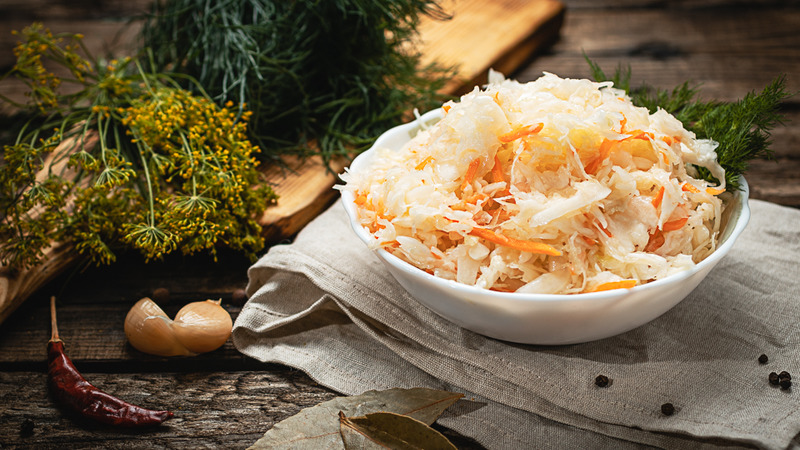
Thus, the content of KBZhU in a 100 g portion is:
- calorie content - 77.8 kcal;
- proteins - 1.6 g;
- fats - 3.1 g;
- carbohydrates - 11.6 g.
In addition, you can add fresh or pickled apples, onions, cranberries, celery, lingonberries, carrots, beets, peppers to cabbage. Any of the ingredients to a greater or lesser extent increases the nutritional value of the product.
In addition to the fact that sauerkraut has excellent dietary and taste qualities, it is a diverse vitamin and mineral complex.
The product includes:
- water;
- alimentary fiber;
- ash;
- water;
- Sahara;
- vitamin A;
- beta carotene;
- B vitamins: B1, B2, B3, B4, B5, B6, B9;
- vitamin C;
- vitamin E;
- vitamin K;
- vitamin PP;
- trace elements: iron, manganese, copper, iodine, aluminum, cobalt, selenium, fluorine, zinc;
- macronutrients: potassium, calcium, sodium, magnesium, sulfur, phosphorus;
- omega-3 and omega-6 fatty acids;
- organic acids: formic, malic, citric, gluconic, succinic, caffeic, chlorogenic, ferulic, tartronic.
If during storage of fresh white cabbage the content of vitamins and minerals decreases, then during its lactic acid fermentation the chemical composition remains unchanged, as well as the benefits for the body.
For reference. Table salt and lactic acid have a preservative effect - they suppress the vital activity of harmful microorganisms, due to which the shelf life is increased without loss of taste, nutritional and useful properties.
Is sauerkraut good for you?
In moderation, sauerkraut will only benefit the body. First of all, it is a storehouse of vegetable carbohydrates and proteins, vitamins, micro- and macroelements, fiber and other components necessary to maintain and stimulate vital processes.
Cabbage is of particular value in winter and spring, when the choice of vegetables and fruits is limited - most of them have lost nutrients during storage or are grown in greenhouses using growth stimulants and chemical remedies.
Benefits for the human body
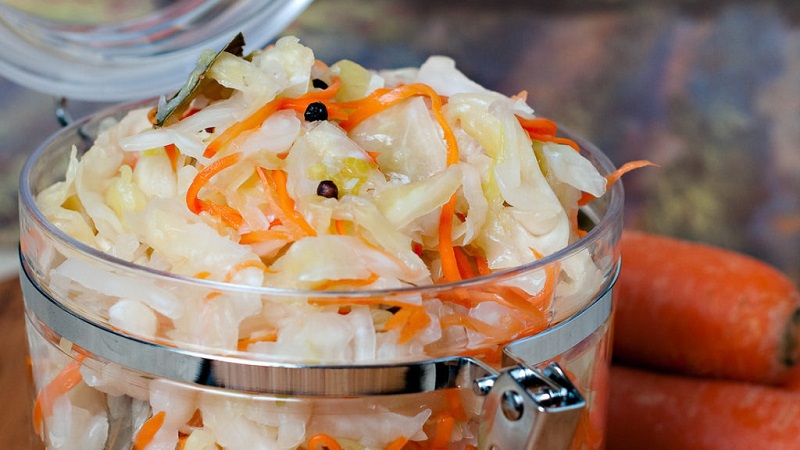
Sauerkraut has a beneficial effect on the entire body, supports the proper functioning of many systems and organs. Various biological active components have anti-inflammatory, antioxidant, diuretic, choleretic effect.Vitamin C protects against infections, strengthens the immune system, and helps to resist colds.
Regularly consuming such cabbage, there is no need to fear for the health of the nervous system: the composition contains B vitamins - vital substances for the body, in particular the brain. Their functions are diverse:
- protect against the negative effects of stress on the body;
- activate mental abilities;
- improve memory, increase concentration;
- strengthen the density of blood vessels and small capillaries;
- reduce the manifestations of asthenia, apathy, agitation;
- have a positive effect on the quality of sleep.
100 g of the product contains 16 mg of magnesium. This is an important substance for the whole organism, which provides cells with energy, is involved in metabolic processes, eliminates vasospasm, normalizes the heart rate, and stimulates the blood circulation process. In people with diabetes, magnesium stabilizes blood glucose levels, thereby reducing the likelihood of new relapses and progression of the disease.
Sauerkraut is important for the prevention of diseases of the digestive system. Its benefits are associated with the presence of lactic acid in the composition - it maintains the balance of intestinal microflora, prevents putrefactive processes and, together with fiber, enhances intestinal motility. The consequence of this is a soft and painless cleansing of the body from toxins and toxins, normalization of stool, lowering the level of cholesterol and glucose in the blood, and improving metabolic processes.
Fiber gives a long-lasting feeling of fullness, slows down the absorption of fats and carbohydrates, which is extremely important and useful for losing weight. Under the influence of gastric juice, the cellulose swells, occupies all the free space in the digestive tract, due to which there is no feeling of hunger for a long time, there is no need for snacks.
Important. Fiber also stimulates physical activity, increases endurance and performance. Thus, more energy is consumed than it is supplied with food, the body begins to spend its reserves of fat, as a result, weight decreases.
The anti-sclerotic effect of sauerkraut is associated with the presence of tartronic acid in the composition, which makes this product indispensable for persons who have impaired blood supply to any organ or tissue.
Tartronic acid activates cerebral blood flow, increases the content of glucose and oxygen in the blood, restores metabolic processes, thereby reducing the likelihood of thrombus formation and cell death. Therefore, sauerkraut is especially useful for the treatment and prevention of cerebral stroke, atherosclerosis, cerebral ischemia, thromboembolism.
Sauerkraut is a powerful antioxidant that slows down the aging process, inhibits oxidative reactions, protects cells from the harmful effects of radicals, and prevents the growth and development of cancerous tumors.
For reference. European scientists have concluded that regular consumption of sauerkraut reduces the likelihood of developing oncopathologies of the stomach, intestines, prostate and breast.
The benefits of sauerkraut for men are obvious. Zinc, selenium stimulate testosterone production. It is the main male sex hormone that affects the development of bone and muscle tissue, regulates sex drive and sexual health. Potassium and magnesium keep the smooth muscles of the penis in good shape, vitamins and fatty acids activate the local metabolism, provide adequate nutrition for the cavernous tissues, which prevents the development of urological diseases and impotence.
Cabbage is no less useful for women's health. The complex of vitamins and minerals has a beneficial effect on the condition of the skin, hair and nails, supports the proper functioning of the organs of the reproductive system, slows down the onset of menopause, and facilitates the course of menopause. During pregnancy it is an additional source of folic acid, without which the full growth and development of tissues and organs of the embryo is impossible.
It is interesting:
Is it possible to eat sauerkraut at night and how to do it right
Is it possible to sauerkraut with breastfeeding
Recipes of lightly salted and sauerkraut instant in 1 day and 2 hours
For the intestines
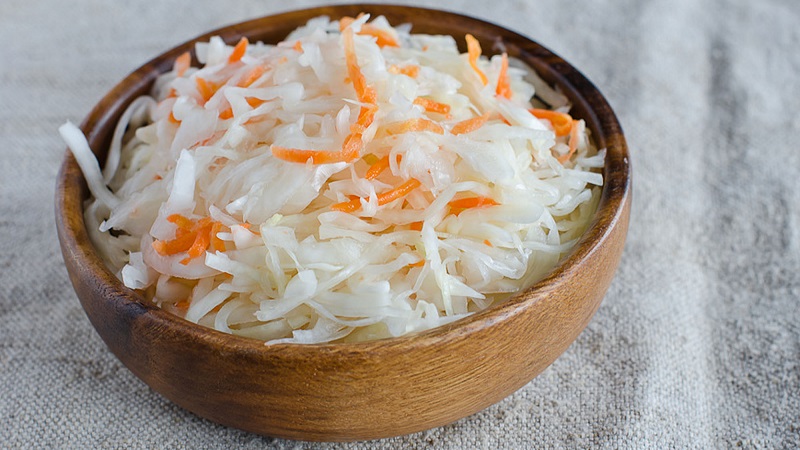
Cabbage contains a large amount of vegetable fiber, which makes it a valuable product for the digestive system. This ingredient supports gastrointestinal health, stimulates bowel function and promotes natural bowel cleansing. Due to hygroscopicity, dietary fiber swells in the intestine and, like a sponge, sorb toxins, toxic substances and other harmful compounds, which are then removed from the body. Cabbage normalizes metabolism, forms a favorable intestinal microflora, supports the functions of the digestive tract.
The components of the composition directly affect the factors of development of diseases of the gastrointestinal tract:
- protect against infections;
- provide full assimilation of nutrients necessary for stable bowel function;
- restore the impaired functions of enzymes;
- regulate the exchange of cholesterol and bile acids;
- normalize enzymatic breakdown of proteins, fats and carbohydrates;
- improve the synthesis of amino acids;
- reduce the permeability of blood vessels for the penetration and damage of cells by toxic substances.
Regular use of the product heals the body, prevents the development of diabetes mellitus, diseases of the digestive system, obesity. In the acute period of gastrointestinal diseases, this product is excluded from the diet, as it enhances intestinal peristalsis and fermentation processes.
For the liver
The benefits of sauerkraut for the liver are associated with the presence in the composition of vitamin K, which is responsible for the proper functioning of this organ, and vitamin E, which promotes the absorption and digestion of food, relieves the liver. Cabbage is rich in sulfur, its main functions are to detoxify and remove from the body toxins, poisons, allergens, final and intermediate metabolic products.
It is a source of antioxidants, due to which regular consumption of cabbage prevents oxidation and damage to cells, restores the function of hepatocytes. These are cells of the liver parenchyma that stimulate the process of bile formation, take part in the transformation of proteins, carbohydrates, and the production of cholesterol.
What else is healthy sauerkraut for the liver:
- Potassium and magnesium reduce the risk of damage to liver cells, and in case of existing diseases, they prevent possible complications.
- Omega-3s preserve cell membranes and protect cells from death.
- Amino acids reduce the amount of toxins, regulate the concentration of cholesterol in the blood.
- Vitamin C improves the self-cleaning processes of the liver.
In the acute period of liver disease, adjustments are made to the diet: sauerkraut, like other marinades, excludes hot spices. The fact is that these products increase bile secretion, which is accompanied by such unpleasant symptoms as soreness in the hypochondrium, colic, and increased gas production.
Application in addition to food
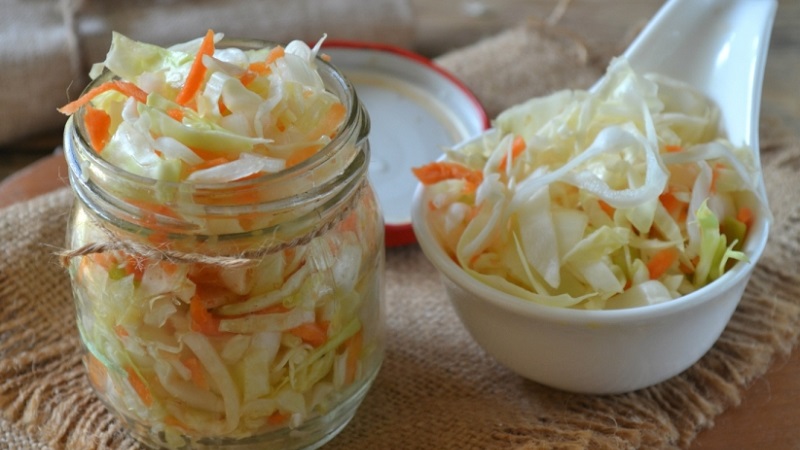
Possessing a wide spectrum of pharmacological activity, sauerkraut has found wide application in alternative medicine for the treatment and prevention of various diseases and conditions.
Attention. Cabbage cannot be considered as the main method of therapy, since the natural plant components of the vegetable are not effective enough to withstand serious pathological processes.
Sauerkraut enhances the effect of conservative procedures, reduces the need for drugs, shortens the treatment time, and saturates the body with vitamins and minerals. Sauerkraut brine is used as a medicinal raw material.
The juice is especially useful for people who have been diagnosed with digestive problems.Brine contains less fiber and does not affect intestinal motility, its use is not accompanied by increased gas production, bloating.
What diseases are used
The list of conditions and diseases when sauerkraut can be useful is very diverse:
- liver diseases: toxic, viral and alcoholic hepatitis, liver intoxication, organ dysfunction;
- diseases of the digestive system: dysbiosis, gastritis with low acidity;
- diseases of the heart and blood vessels: atherosclerosis, hypertension, ischemia, myocardial infarction, thrombosis;
- neurological disorders;
- oncological diseases;
- physical stress;
- avitaminosis;
- bronchial asthma;
- allergy;
- constipation;
- obesity;
- diabetes.
Cabbage is especially useful for the elderly, children and adolescents. Calcium contained in the composition provides adequate mineralization of teeth, growth and formation of bone tissue, in the elderly it prevents a decrease in strength and an increase in bone fragility.
Cabbage brine is a proven hangover cure. It also helps to get rid of edema, restore heart rate, lower high blood pressure, and replenish the deficiency of vitamins and minerals in the body.
In cosmetology

Sauerkraut and pickle are popular beauty products. Active biological components have a beneficial effect on the skin:
- retinol slows down the aging process, has regenerative properties;
- vitamin E stimulates collagen production, which prevents the appearance of early wrinkles;
- antioxidants even out the epidermis of the skin, prevent the formation of new acne breakouts;
- folic acid protects against the negative effects of environmental factors, UV rays, prevents the appearance of age spots;
- vitamin K strengthens the vascular walls, normalizes blood circulation, neutralizes dark circles under the eyes.
With regular use, the food product solves several problems at the same time: eliminates dryness and peeling, tones, relieves inflammation, regulates the sebaceous glands, and reduces the appearance of age spots.
The benefits of cabbage brine for hair are obvious. They lubricate the scalp with baldness, seborrhea, to strengthen the roots and enhance hair growth. At the same time, the hair becomes soft, silky, the skin is restored, dandruff disappears.
Slimming

This is an indispensable product for those who want to get in shape after periods of overeating or get rid of extra centimeters at the waist and hips. It is used as an independent product with a small amount of vegetable oil, in various salads, served as a side dish for meat and poultry.
There are many varieties diets on sauerkraut, ranging from gentle options, in which other foods from the list of permitted products are present in the diet, in addition to cabbage, to more severe ones, when the basis of the diet is sauerkraut + a lot of free liquid.
Rigid diet options are imbalanced in nutritional nutrients, so they should not last more than 3 days. If you are aiming to follow the dietary regime longer, it is recommended to expand the diet, mainly due to fresh fruits and vegetables, herbs, low-fat meats, poultry and fish, cereals. Such a diet can be designed for 3, 5, 7, 10 and 14 days. By reducing the daily calorie content to 1200-1400 kcal for women, and 1600-1800 kcal for men, a fairly rapid, but safe in terms of maintaining health, weight loss occurs.
The cabbage diet menu depends on gastronomic preferences, the desired result and financial capabilities. With any variant of the diet, sweets, salt and sugar, flour, white bread, smoked meats, semi-finished products, fatty meats, poultry and fish, canned food, pickles, alcohol, and sugary carbonated drinks are completely excluded (or seriously limited) from the diet.
Council. It is advisable to abandon spices, seasonings that increase appetite. When a feeling of hunger appears, dried fruits, fruits (except for bananas and grapes), low-fat dairy products are chosen as a snack.
During and after the cabbage diet, it is important to drink at least 1.5-2 liters of free liquid per day.It can be mineral water without gas, weak black / green tea without sugar, freshly squeezed vegetable and fruit juices, herbal infusions, decoctions.
The effectiveness of the process of losing weight directly depends on a particular person, the characteristics of the body and metabolism, the ability to clearly follow the chosen diet plan. On average, you can reduce body weight by 0.5-0.7 kg per day. A more rapid weight loss is fraught with metabolic disorders, the development of new diseases or an exacerbation of old chronic pathologies.
To maintain the obtained result and prevent a quick return of the lost kilograms, the correct exit from the diet is important. For this, previously prohibited products are introduced in small portions and one at a time every day, starting with cereals and ending with meat / fish dishes. It is recommended to continue to observe an abundant drinking regime, limit salt, sugar, and alcohol.
Why is sauerkraut dangerous?
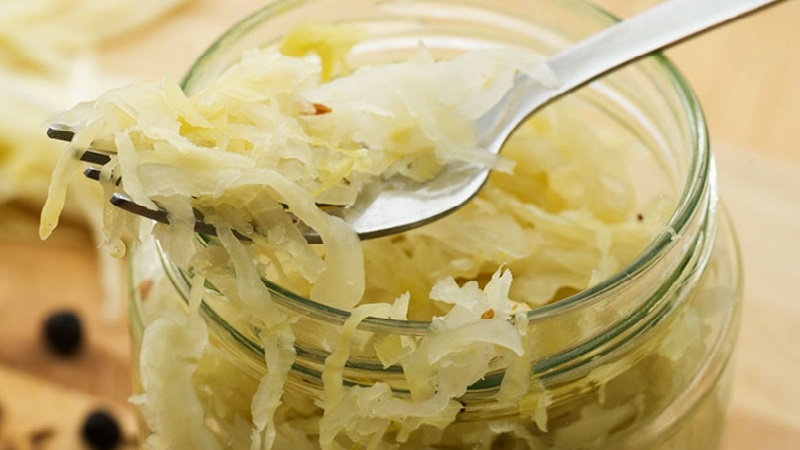
On the Internet, you can find different reviews about sauerkraut, both in terms of weight loss, and in relation to the effect of the product on systems and organs. The benefits and harms of sauerkraut for the body directly depend on the variety and quality of the main ingredient, the method of consumption. The daily norm without the risk of developing adverse reactions ranges from 100-200 g of the product, depending on the conditions of the gastrointestinal tract, age.
Long-term and heavy use can worsen overall health, provoke problems such as bloating, heartburn, soreness in the lower abdomen, diarrhea. The product contains a lot of salt, which interferes with the outflow of fluid, which causes body edema, increased blood pressure, and provokes the development of cardiovascular diseases.
Other adverse reactions caused by excessive consumption of sauerkraut include osteoporosis (decreased bone density), disruption of the digestive system, allergic reactions in the form of rashes, peeling on the skin, urticaria.
Even such a healthy vegetable has contraindications:
- individual intolerance to the product;
- severe urolithiasis;
- impaired liver and kidney function;
- low blood pressure;
- gastrointestinal diseases, especially in the acute stage: stomach and duodenal ulcers, gastritis, colitis.
Due to the fact that sauerkraut removes iodine from the body, persons with thyroid problems should limit its amount in the diet.
Conclusion
Sauerkraut is a year-round and affordable product that is especially popular in winter as a source of vitamins, micro- and macroelements. In addition to excellent taste, it has a low calorie content, which allows the product to be used in dietary nutrition. In folk medicine, sauerkraut is used to treat and prevent various painful conditions.